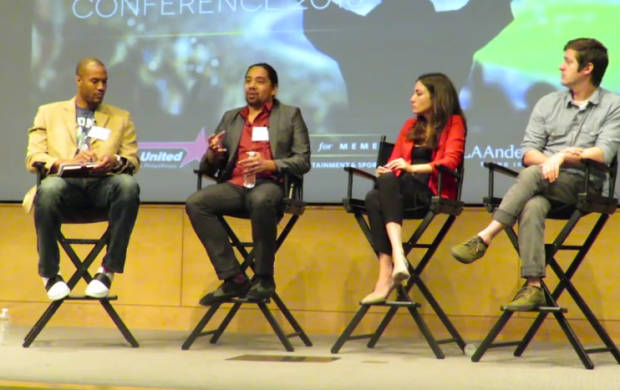Last Wednesday, All Sports United and UCLA Anderson School of Management presented Sports with a Purpose, a dynamic full-day conference focusing on sports and philanthropy. All Sports United is a non-profit corporation that educates and empowers professional athletes and sports industry professionals to engage in efficient philanthropic work.
The conference featured speakers and panelists consisting of well-known athletes, sports personalities, and experts in philanthropy and technology who were able to cover an array of related subjects. “Engaging Millennials in Cause Marketing via Social Media” was one of the many panels featured at the conference. Millennials and social media seem to have all of the buzz these days, for this reason it is vital that nonprofits understand how to appropriately engage this target audience effectively and appropriately in order to maximize their success.
The panelists were three esteemed individuals: Gary Wohlfeill, Hayley Pappas, and Emerson Valiao. Gary Wohlfeill has been the director of marketing at Crowdrise since November, 2012. Crowdrise is an innovative and cost-effective online fundraising website for personal fundraisers, non-profit fundraising, and event fundraising that engages consumers by aiming to make fundraising more enjoyable. Hayley Pappas is the head of films at RYOT, the first news website that links every story to a related, cause-based action. Emerson Valiao is the CEO and Founder of Flipcause, Inc. Flipcause helps hundreds of nonprofits across the US optimize their development programs through innovative technology. He has spent the last 4 years working to ensure that any sized organization, regardless of their budgets or technical chops, have access to the tools they deserve at a price they can afford. The moderator for the panel was Scott Graham. Graham is the Chief Technology Officer for Coin Up, a mobile app that allows people to donate their spare change to causes they care about every time they make a purchase on their credit or debit card.
Watch the video of the panel here:
If you don’t have time to watch right now, here’s a quick synopsis:
● What is cause marketing and how does it relate to the millennial generation?
Traditionally, cause marketing is when for-profit companies align their product with a social mission in order to create an impact as well as to generate profit. About 90% of millennial donors are willing to switch brands based on their ability to give back to a cause. However, a company’s cause must align with their target market in order to be effective.
● Reaching out to the millennial generation
In order to reach millennials, help them define their own narrative in how they’re making an impact and support the causes they are passionate about. It is important to understand the self-interested mentality amongst millennials in order to incorporate it within your organization’s communication strategy or in the way that you approach that demographic.
● Slacktivism and millennials
Slacktivism is when one appears to be socially active within a cause, usually via the internet, without actually doing anything. However, “Through social media, your ‘like’ carries a new currency”. As a result, the digital media landscape has bred a culture of empowerment and engagement rather than slacktivism.
● Gamification and connecting to millennials
When something becomes a game, the original objective which was once burdensome, is now exciting and highly engaging for the individual. Gamification also creates a “crate of leverage” for the company which means that a client who has done something previously for a cause is now more inclined to do something else in the future with less hesitation. Overall, games bear movements and communities.
● Millennials and their lack of money
“The millennial generation is the largest workforce in the United States” which means that although millennials may not have a lot of money, there are a lot of them working. For larger organizations, crowdfunding is an effective solution to raising money through the accumulation of varying donations. Although crowdfunding may not be an option for smaller nonprofits, they can engage support at some level, such as through social media or volunteering, and then expand on that relationship in order to convert their supporters into sustaining donors.
● How an organization can choose their platform
It is important for an organization to know their audience and what channel they are using in order to choose their platform. The organization must also dedicate time, put together a schedule, and test various things out on different channels in order to ensure that they are effectively delivering appropriate content to their target market.
Check out the video of the panel for more information and let us know your thoughts or questions on engaging millennials in cause marketing!




